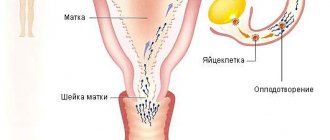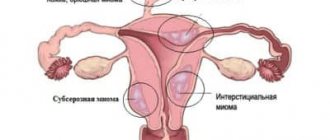Thrush during pregnancy
Thrush during pregnancy occurs in 30% of females, and the definition of pathology does not always mean that fertilization has occurred.
Thrush in early pregnancy before the delay sometimes occurs 6-7 days after conception. The woman feels all the signs of infection, which may persist until the day of delivery. The discharge that appears will become abundant and this is due to an increase in blood supply in the pelvis. The appearance of a sharp complication is associated with a weakening of the body's defenses. Candida fungus causes a pathology that is diagnosed in small quantities in the vagina in healthy women.
Thrush has several characteristic signs:
- The discharge is copious;
- White color;
- Consistency – curdled;
- The smell of the discharge is sour;
- Itching, burning and swelling of the genitals;
- Discomfort during sexual intercourse.
As the disease progresses, these symptoms intensify.
https://youtu.be/jFlDjnGUBFo
Signs of thrush
All women have heard about thrush, even those who have never encountered its symptoms. Significant manifestations of this disease are redness of the labia and skin, itching and burning, intensifying after taking a shower, as well as white discharge with a cheesy consistency. Usually, with such symptoms, it is difficult for a woman to walk, she simply needs a daily sanitary pad, and she does not even think about sexual intercourse. In more serious cases, a deterioration in the general condition is noticed, for example, the temperature rises, nausea appears, and the skin in the groin area becomes too dry.
What causes thrush to appear?
An increase in progesterone can provoke the disease. After fertilization of the egg and the birth of the placenta, the level of the hormone constantly increases. His role is invaluable and important. It helps the embryo enter the uterus. This hormone is directly related to a woman’s emotional state, which is why women expecting a child experience mood changes so often. If the quantitative indicators of any type of hormone change, then the microflora immediately reacts to such surges and falls.
Because of this, in the first 2-3 weeks, when a delay in menstruation appears, it is advisable to conduct a pregnancy test. When ovulation occurs, which is characterized by hormonal surges, the microflora also begins to change.
- Having successfully established itself in the uterus, the embryo and placenta, together with the adrenal glands, begin to release a large amount of estrogen into the blood, while the pregnant woman’s psychological state improves and manifestations of candidiasis again arise;
- Chorionic gonadotropin, which appears in pregnant women, activates the function of the thyroid gland. It, in turn, produces a hormone that promotes cell regeneration. This has a positive effect on the condition of the woman’s body, but hormonal changes will provoke the growth of pathogenic candida. Such hormonal changes almost always lead to the proliferation of a fungus that was already present in the pregnant woman.
Thrush after ovulation
Women who calculate their cycles using a calendar know the days on which they ovulate. If after this event the discharge pattern changes and symptoms of thrush appear, they consider this a sign of pregnancy. However, this does not always mean that conception has occurred. During ovulation, as during pregnancy, an increased amount of the hormone progesterone is produced, this is important for blocking the immune system in preparation for pregnancy. Lymphocytes can interfere with egg implantation. Against the background of a decrease in the number of protective cells, the fungus multiplies.
In addition, if ovulation occurs against the background of a weakened body, poor nutrition, the presence of diseases of the endocrine system and hypothermia, the risk of developing candidiasis is increased. In this case, thrush is not a sign of pregnancy, but a signal that there is a problem. Mild forms of the disease do not affect conception, while severe candidiasis can interfere with fertilization.
The disease “thrush” is familiar to most women. At least once in our lives, each of us has encountered the following symptoms: increased vaginal discharge, itching, irritation in the “intimate area”; redness, soreness.
It would seem that when this starts, there is nothing to rejoice at. But girls who want to quickly realize themselves as mothers have reason to think otherwise: thrush as a sign of pregnancy (or rather, one of the signs) is quite likely. Why?
Menstrual irregularities after thrush
A delay in menstruation after thrush is a reason to identify the relationship between the disease and the regularity of menstruation. There are many reasons that can provoke thrush and delayed menstruation. One of them is possible pregnancy. Therefore, if there is a delay in menstruation after thrush, it is necessary to conduct a pregnancy test. If it is negative (there is no pregnancy), then further examination is necessary to identify other reasons that influenced the delay in menstruation.
Often, cycle disruption occurs precisely at the moment when this disease is diagnosed. There are several reasons. One of them is that the delay after thrush occurred due to its treatment with medications. At the end of treatment, the woman’s body will recover and menstruation will return to normal.
Prevention
To prevent the development of the disease, a woman should take care of her health even at the stage of pregnancy planning, undergo examination for infectious pathologies and strengthen her immune system. To avoid exacerbation of the disease, a number of rules should be followed:
- if a woman already suffered from thrush before pregnancy, she should undergo a course of treatment at the planning stage;
- wear cotton underwear - such fabric allows moisture to pass through, while synthetic materials contribute to the creation of a greenhouse effect - favorable conditions for the proliferation of candida;
- during hygiene procedures, use not ordinary soap, but special products containing lactic acid;
- During treatment, boiled water should be used for intimate hygiene; only the external genitalia should be washed;
- Do not stay in the sun for a long time, avoid overheating.
Diet
Diet is important for the prevention and treatment of thrush. Some foods promote the proliferation and growth of fungus. Therapy will not be effective until foods containing simple carbohydrates are excluded from the pregnant woman’s diet:
- sugar;
- confectionery;
- honey;
- preserves and jams;
- dried fruits;
- chocolate;
- fruits with a high sugar content, juices from them;
- starchy foods: white rice, potatoes.
A diet limiting the consumption of simple carbohydrates should continue for at least 3 months. It is also necessary to avoid spicy seasonings and sauces. Products containing yeast: kvass, baked goods contribute to the growth of candida. It is necessary to try to completely exclude strong tea and coffee.
Recommended to use:
- garlic, green and onions;
- natural yoghurts and products containing probiotics;
- sour berries and fruit drinks made from them without added sugar;
- vegetables and unsweetened fruits;
- seafood;
- vegetable oils (olive and flaxseed);
- parsley dill;
- lean meat, poultry and fish;
- legumes;
- buckwheat, brown rice;
- wholemeal bread;
- nuts and seeds;
- it is necessary to observe the drinking regime: at least 1.5 liters of water per day, herbal infusions of chamomile, plantain, oregano;
- vitamin complexes that increase immunity;
- probiotics with lactobacilli.
Delayed menstruation due to thrush
Many women who have learned what thrush is will answer the question: “can menstruation be delayed due to thrush?” Thrush with a delay in menstruation is a common phenomenon. In this case, the woman feels pain, an unpleasant odor and irregular menstruation.
Found in almost any body, the fungus becomes aggravated and provokes unpleasant symptoms when immunity decreases and the nature of the microflora changes. This is due to the fact that at this time candida acquires pathogenic properties. Their active settlement occurs, which contributes to the delay of menstruation. Blood during menstruation becomes an excellent environment for the growth of Candida.
At the early stage of the disease, thrush does not affect the regularity of menstruation, but during an exacerbation and progression into a chronic form, it leads to the yeast fungus entering the uterus and ovaries, causing an inflammatory process. And this, in turn, contributes to a delay in menstruation.
Main signs of pregnancy
Some women feel the condition of pregnancy in the early stages, others notice it later - after the onset of a missed period. The onset of conception can be determined by the following signs:
- enlargement of the mammary glands, increased sensitivity, the veins in the chest swell, the nipples become painful, the temperature in the armpits rises;
- painful spasms in the lower abdomen and a feeling of heaviness periodically appear;
- a woman often feels the urge to urinate;
- weakness, fatigue;
- impaired attention and decreased performance;
- change in eating habits;
- formation of foci of hyperpigmentation;
- swelling and redness of the external genitalia;
- nausea, vomiting;
- absence of menstrual bleeding, but it is possible to continue menstruation for another 1-3 months with a change in the amount of discharge.
There are other symptoms that not everyone experiences, but some pregnant women may suspect their condition from them. Constant nasal congestion, dysfunction of the digestive system, increased flatulence, increased salivation, painful cramps in the calf muscles may indicate the onset of conception. Thrush as a sign of pregnancy also occurs in many women. Symptoms of candidiasis often appear immediately after conception, before the onset of a missed period.
The main signs that determine pregnancy before delay
An observant woman, when planning a pregnancy, may notice several criteria in her body that characterize the presence of pregnancy before a missed period.
The first signs of pregnancy: thrush, malaise, weakness, bloody vaginal discharge, basal temperature more than 37 degrees.
These manifestations should be regarded as obvious manifestations of pregnancy before the delay, but only if all processes are present at once. The presence of one of the symptoms indicates illness.
At the early stage of pregnancy, the content of hydrogen ions in vaginal secretions increases. Its purpose is to protect the pregnant woman’s body from the spread of harmful bacteria, which can cause pathologies in the development of the fetus.
In addition to beneficial properties, hydrogen ions create a certain discomfort caused by thrush. If no other factors are present, then we can talk about the presence of candida in the vagina.
Possible complications caused by candidiasis during pregnancy
Thrush during pregnancy must be treated because it can cause complications.
For example, other diseases may develop or candidiasis may reappear. Thrush also affects the fetus; it can cause the development of hypoxia, because this disease impairs the flow of oxygen through the placenta. If thrush appears before birth, the doctor must prescribe emergency treatment because the disease can be passed on to the baby. The newborn's skin, eyes and nasopharynx are affected. In very serious cases, the baby may die due to thrush, since his body cannot yet fight this disease. Even if a woman gives birth by cesarean section, the baby can develop thrush, research shows. More than 70% of children became infected with it during childbirth, when the mother had a cesarean section.
In addition to the fact that the disease can affect the baby, thrush impairs the elastic properties of the skin, so tears may naturally appear during childbirth. For this reason, fast and effective treatment is very important for both mother and baby.
When a woman plans to become pregnant, she needs to carefully monitor her health. Before conception, it is better to undergo a full examination to exclude the possibility of diseases occurring during pregnancy. After conception, the expectant mother should pay attention to vaginal discharge, as it can tell a lot. In the first months after fertilization, thrush may appear; it is often diagnosed even before a missed period, which is why the disease is considered the first symptom of pregnancy.
But in addition to thrush, other discharge may appear. For example, if they are white, liquid in consistency and without a strong odor, this is normal. If brown, green or thick white discharge appears, a woman should seek help. This may be a sign of the development of other diseases of the genital tract or the threat of pregnancy failure.
Why is thrush dangerous during pregnancy?
Key points affecting the fetus:
- It is important to monitor the amount of mucus released from the vagina. Heavy discharge may be a sign of ruptured membranes. During a short period of pregnancy, drug treatment is used, and during a long period, the woman is given artificial birth;
- The causative agent of candida is microscopic and can penetrate through the tissue into the amniotic fluid. A child who swallows it becomes infected with thrush. As a result, candida causes defects in the optic and mucous canals and enters the lungs and mouth. The child is born weak and will lag behind in physical development;
- Yeast fungus produces a large mass of toxins that constantly expose the body to intoxication. The consequence is weak immunity in the newborn and mother;
- Thrush causes an inflammatory process in the vagina, and if treatment is not started on time, there is a risk of miscarriage.
The danger of thrush in early pregnancy
The fetus, while in the uterus, is protected from harmful influences, however, advanced cases of infectious diseases of the reproductive system can have an adverse effect. The acute form of thrush after conception can spread upward and cause the development of complications. The fetal immune system is not yet fully developed, so thrush poses an immediate danger. Intrauterine infection can cause developmental disorders. Frequent complications of the disease: chlamydia, cytomegalovirus infection can cause termination of pregnancy.
Candidiasis negatively affects the membranes of a woman’s internal genital organs; numerous lesions form on them. They gradually penetrate deeper and deeper, resulting in the formation of adhesions that disrupt the normal extensibility of tissues. This condition is dangerous, as the growth of the uterus is hampered, and there is a risk of miscarriage. In addition, candidiasis interferes with sleep and disrupts the usual routine of life. The period of bearing a child is extremely stressful. A constant feeling of burning and itching negatively affects the psychological state. Active symptoms in the first trimester of pregnancy can lead a woman to a nervous breakdown and cause a miscarriage.
Reasons for the spread of the disease
After fertilization of the egg, a specific restructuring of all systems of the mother’s body occurs. There are two main reasons for the occurrence of thrush during this period: a decline in immunity and changes in hormonal levels.
In response to the implantation of the embryo, the immune system temporarily weakens its protective functions to eliminate the possibility of its rejection. Despite the fact that the uterus ceases to perceive the growing embryo as a foreign body, many pregnant women still experience signs of poisoning: they feel sick in the morning, feel dizzy, and have a rise in body temperature.
The vaginal mucosa ceases to provide adequate resistance to pathogenic organisms, so in the first days after conception, symptoms of fungal diseases of the reproductive system often appear.
Another cause of thrush at the beginning of pregnancy is the increased production of the following hormones:
- progesterone;
- estrogen;
- human chorionic gonadotropin.
Each of these hormones is not only responsible for preserving the life and full development of the fetus, but also accelerates the division of epithelial cells of the internal genital organs, accompanied by increased synthesis of lactic acid.
Toxicosis, which occurs at 4-12 weeks of pregnancy, is often accompanied by a change in taste preferences. Many women at this time consume large amounts of baked goods and sweets, which also provoke the development of vaginal candidiasis. Other factors that contribute to the growth of pathogenic microorganisms are stress, chronic fatigue, and wearing synthetic underwear.
In addition to reducing the properties of the protective system, there are other reasons for the spread of the disease. The problem may occur in pregnant women if the following factors are present:
- various concomitant pathologies;
- use of antibiotic drugs;
- poor nutrition;
- transmission of viral diseases;
- non-compliance with intimate care;
- the presence of endocrine diseases;
- restructuring of the hormonal system;
- tight synthetic underwear;
- hypothermia.
Thrush in the first trimester of pregnancy can be detected due to the activation of various chronic diseases. Candidiasis is detected in patients who have deviations in the microflora of the gastrointestinal tract. Gastritis, ulcers, colitis cause the death of beneficial substances in the intestinal mucosa. The place of beneficial microorganisms is taken by pathogenic microflora.
After therapy with anibiotics, opportunistic fungi are the first to recover. It was noted that after such therapy, many patients are diagnosed with thrush.
One of the common causes of thrush is poor nutritional choices. Spicy seasonings and vegetables cause irritation to the walls of the gastrointestinal tract. Against the background of such nutrition, inflammation develops. Frequent consumption of spicy fried foods leads to worsening of the disease. Beneficial bacteria living in the inflamed area die.
We invite you to familiarize yourself with Zyrtec Drops for children: instructions for use, price and reviews, how to take them
Other factors
Some viral infections occur in the body unnoticed by others. They pass hidden from view. The absence of symptoms leads to the infection becoming chronic. Any irritating factor increases the disease. Due to this, the activity of the immune system gradually decreases. During pregnancy, the body's protective functions also decrease. The overlap of these processes leads to the proliferation of the fungus. Candidiasis is detected in the first weeks of pregnancy.
A common reason why thrush appears during early pregnancy is failure to comply with the rules of intimate care. Every day a woman must cleanse her genitals of secretions and waste products. For this purpose, special cosmetics for intimate hygiene should be used.
Problems are often found in women with a history of endocrine pathologies. Diabetic disease causes damage to vascular tissue and hormonal levels. Vascular damage leads to a decrease in the supply of oxygen to various tissues. An insufficient amount of oxygen is accompanied by a decrease in metabolic processes.
After some time, the tissue stops actively renewing itself. This process leads to the destruction of several layers of tissue. Diabetics have fistulas and ulcers. Damage to the upper layer of the epidermis causes disruption of the microflora. Candida finds itself in a favorable environment. The fungus quickly spreads throughout the body. In pregnant women with diabetes, thrush is diagnosed during all trimesters.
Hormonal changes also matter. Thrush is detected at the beginning of pregnancy due to an increase in the progesterone hormone. Progesterone promotes proper growth and development of the embryo. Progesterone is produced by the corpus luteum, which forms at the site of the dominant follicle. The production of the hormone is accompanied by a change in blood circulation in the uterine cavity.
The reason may be wearing the wrong underwear. Tight synthetic panties make it difficult for oxygen to reach the skin of the genitals. Lack of air is accompanied by the development of inflammation of the reproductive system. Thrush actively multiplies on the affected tissues.
Pathology is also detected with severe hypothermia. Due to this, immune defense is reduced or beneficial microflora dies. Both processes are accompanied by vaginal candidiasis.
Symptoms of the disease
Thrush during pregnancy in the 1st trimester does not always have clear signs. Attention should be paid to the presence of such symptomatic manifestations as:
- changes in the structure of vaginal secretions;
- the presence of an uncharacteristic odor from the discharge;
- irritation of the external genitalia;
- additional signs.
The first symptom of thrush is a change in the structure of vaginal secretions. Normally, discharge should be white, uniform and not abundant. If the secret does not have such qualities, you need to seek help from a doctor. The color of the secretion should also cause concern. With thrush, yellow, beige, curd-like discharge is observed.
You should monitor the smell of vaginal secretions. The appearance of an uncharacteristic sour or fishy odor should be accompanied by a visit to the doctor.
Additional symptoms may be added to the general symptoms. Patients complain of pain in the abdomen or lower back. Itching and unpleasant burning sensations often occur in the labia area.
We suggest you read Where to get tested for nail fungus
Characteristics of the disease
Pregnancy in the early stages causes various processes in the body.
The restructuring is accompanied by changes in hormonal levels. All these processes cause a partial decrease in the body's immune defense. The protective function decreases when the egg is fertilized. These qualities contribute to the introduction of the formed zygote into the uterine wall. Against the background of a decrease in the protective properties of the body, the mucous membranes are damaged by a variety of bacteria. During pregnancy, the cervix is tightly closed with a plug. Pathogenic microflora has a negative effect on the vaginal microflora. The death of beneficial microorganisms occurs.
All people live in their bodies with various microorganisms and bacteria. There are two main groups: beneficial and opportunistic microorganisms. They are components of microflora. After the death of beneficial microbes, opportunistic bacteria are activated and occupy the vacated areas. An increase in the colony of these microbes leads to the development of various vaginitis.
The most common fungus in the human body is candida. This fungus lives on the skin, vagina, intestines and gastrointestinal tract. Activation of candida leads to its rapid spread.
Symptoms of the disease
Typical signs of a fungal infection include:
- copious thick discharge of white or slightly yellowish color in the form of lumps of mucus or flakes;
- the appearance of an unpleasant sour odor;
- unbearable itching and pain in the vagina;
- dryness, discomfort and burning in the genital area.
Sometimes discharge from thrush in pregnant women is insignificant or completely absent. The disease can be accurately diagnosed only by taking a smear for the presence of pathogenic flora.









